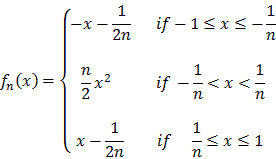8.1. Pointwise Convergence
Example 8.1.8 (b): Pointwise Convergence does not preserve Differentiability
We first need a function that is continuous but not differentiable. Then we will try to find a sequence of differentiable functions that converge to it.
Our prime example of a non-differentiable, continuous function is, of course, the absolute value function f(x) = |x|. To approximate it by differentiable functions we need to "smooth out" the "kink" at x = 0, for example with a piece of a parabola. In other words, we need a function defined in multiple pieces:
- to the left of x=0 the function should look similar to the negative part of the absolute value, i.e. f(x) = -x
- to the right of x=0 the function should be close to the positive part of the absolute value, i.e. f(x) = x
- in a small neighborhood of x=0 the function should look like a parabola f(x) = a x2 for some positive constant a
- of course the function should depend on a parameter n in
such a way that:
- the function is differentiable
- the function is continuous
- the function is 'close' to |x|
Let's decide that the 'small neighborhood' mentioned in part 3 is the
interval (-1/n, 1/n), inside which the function is a parabola.
To ensure its derivative matches up with the derivatives outside that
interval, we need f'(x) = 2a x =  1
when x
1
when x  1/n. Thus,
a = n/2. Finally we need to patch our function to make it
continuous at x
1/n. Thus,
a = n/2. Finally we need to patch our function to make it
continuous at x  1/n. Our
finished product is:
1/n. Our
finished product is:
|
|
|
You should verify that this function has all of the desired properties:
- fn(x) is continuous at
1/n and in fact in [-1, 1]
- fn(x) is differentiable at
1/n and in fact in [-1, 1]
- fn(x) converges to f(x)=|x|
 Interactive Real Analysis
Interactive Real Analysis